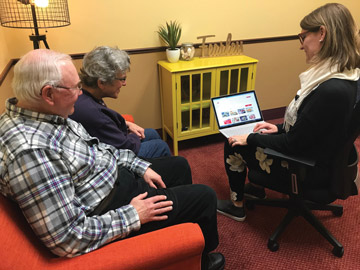Patients in a suboptimal nutritional state are at increased risk of being hyperglycemic and experiencing insulin resistance brought about by the trauma of surgery, according to Elizabeth Goldenberg, MPH, RD, CDN, a registered dietician at Weill Cornell Medicine in New York, N.Y. "They're also more likely to have more GI symptoms and experience PONV," says Dr. Goldenberg. She points out optimizing pre-op nutrition puts patients in an anabolic state, during which the body builds lean muscle mass, instead of a catabolic state, which involves the loss of body mass.
As soon as possible after cases are scheduled (ideally 6 to 12 weeks before surgery), Ms. Yoder spends an hour with patients to review their medical histories, the medications and supplements they're taking, the average amount of sleep they get on a nightly basis. She asks about their cooking habits, stress levels and home life. She then creates interventions specific to their needs to help promote weight loss and manage existing comorbidities. "It's important to set realistic goals for patients, so they feel motivated to change their health status," says Ms. Yoder.
She prioritizes the care of patients with BMIs over 40 who are at higher risk for complications during and after surgery. Her goal is to help patients lose weight and build lean muscle mass, which helps support the body's structure. Lowering a patient's BMI also reduces pressure on joints and decreases the body's inflammatory response to surgery. Patients who lead healthier lifestyles and lose weight before surgery are better prepared to complete rehab exercises and often require lower dosages of prescribed medications that could increase risks of surgical complications. Some might even be able to stop taking drug therapies altogether.
Effective weight loss isn't about using fad diets for a quick fix, points out Ms. Yoder. After comprehensive assessments of patients, she modifies their lifestyles and nutrition plans based on evidence-based interventions. For that reason, most patients' insurance plans pay for her services. She teaches them how to recognize sensations of hunger and fullness, and gives them a deeper understanding of the physiological impact of specific foods and the overall importance of improving their nutrition.
Ms. Yoder instructs patients to eat nutrient-dense foods and emphasizes the importance of a back-to-basics approach to nutrition: Vegetables, grains, lean proteins and healthy fats provide the body with essential nutrients that increase metabolism and improve immune function, which increases the body's ability to fight infection and improve wound healing after surgery.
Patients with high blood pressure are instructed to monitor their sodium intake and eat more fruits and vegetables to increase the amount of potassium in their diets. Even a seemingly small reduction in body fat (3% to 5%) leads to improvements in blood pressure values, says Ms. Yoder.
She provides busy professionals with home recipes and offers tips for batch cooking, so they don't rely on the convenience of ordering out. Her goal is to work with patients to create sustainable lifestyle changes.
"We find the right amount of fuel for their bodies," says Ms. Yoder. "They have to be able to perform daily tasks and maintain immune function and health leading up to and after surgery."
.svg?sfvrsn=be606e78_3)

.svg?sfvrsn=56b2f850_5)